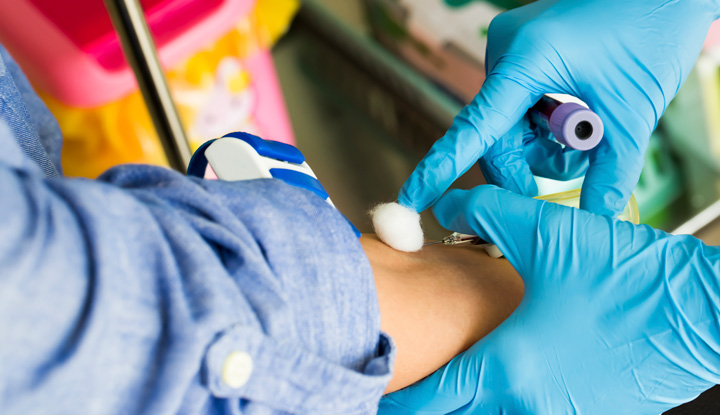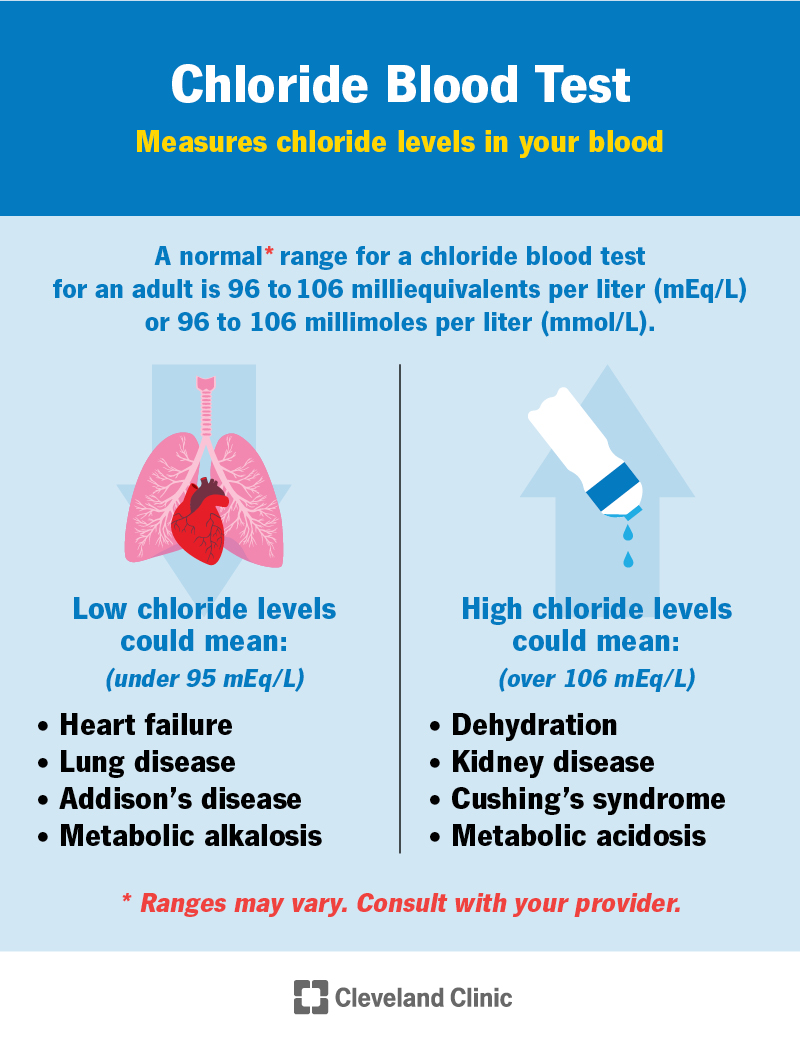Chloride is one of the electrolytes in your blood. Chloride blood tests check to make sure you have appropriate levels of chloride in your blood to be healthy. Many factors can cause an abnormal level of chloride in your blood, including dehydration, vomiting and certain medical conditions.
Advertisement
Cleveland Clinic is a non-profit academic medical center. Advertising on our site helps support our mission. We do not endorse non-Cleveland Clinic products or services. Policy

Image content: This image is available to view online.
View image online (https://my.clevelandclinic.org/-/scassets/images/org/health/articles/22023-chloride-blood-test)
A chloride blood test (serum chloride) measures the level of chloride in your blood.
Advertisement
Cleveland Clinic is a non-profit academic medical center. Advertising on our site helps support our mission. We do not endorse non-Cleveland Clinic products or services. Policy
Chloride is an electrolyte. Electrolytes are minerals that carry an electric charge when they’re dissolved in a liquid. The electrolytes in your blood — chloride, sodium, potassium and bicarbonate — help control nerve and muscle function and maintain the acid-base balance (pH balance) of your blood and your water balance.
The amount of chloride in your blood is often measured along with other electrolytes to diagnose or monitor certain medical conditions, including:
Healthcare providers usually don’t order individual chloride blood tests. Chloride blood tests are usually included in the following routine blood tests and screenings that measure multiple things in your blood:
Your healthcare provider may order a chloride blood test as part of a routine blood panel. They can also order a chloride blood test if you have symptoms of an acid or fluid imbalance, including:
Advertisement
The results of a chloride blood test, alongside the results of other electrolyte tests, can help diagnose a condition related to an imbalance of acids or fluids in your body.
You don’t need any special preparations for a chloride blood test or an electrolyte panel.
A chloride blood test may be part of a basic or comprehensive metabolic panel, which measures multiple things in your blood. In this case, you may need to not eat or drink (fast) for several hours before your blood draw. Your healthcare provider will let you know if you need to follow any special instructions.
You can expect the following during a blood test:
After a healthcare provider has collected your blood sample, they’ll send it to a laboratory for testing. Once the test results are back, your healthcare provider will share the results with you.

Image content: This image is available to view online.
View image online (https://my.clevelandclinic.org/-/scassets/images/org/health/articles/22023-chloride-blood-test-results)
Blood test reports, including chloride blood test reports, usually provide the following information:
A typical normal range for a chloride blood test for an adult is 96 to 106 milliequivalents per liter (mEq/L) or 96 to 106 millimoles per liter (mmol/L). But laboratories may have different reference ranges for normal chloride levels. When you get your blood test results back, there will be information that indicates what that lab’s normal blood chloride range is. If you have any questions about your results, be sure to ask your healthcare provider.
If your results reveal that you have lower-than-normal levels of chloride in your blood, it may indicate that you have:
It’s important to remember that a low chloride result doesn’t necessarily mean that you have a medical condition. Certain situations and medications can also increase your chloride levels.
Advertisement
If your results reveal that you have higher-than-normal levels of chloride in your blood, it may indicate that you have:
It’s important to remember that a high chloride result doesn’t necessarily mean that you have a medical condition. Certain situations and medications can also increase your chloride levels.
If your chloride blood test results reveal that you have high or low levels of chloride, it doesn’t necessarily mean that you have a medical condition. Many factors can affect your chloride levels, including:
Your healthcare provider will interpret your chloride result within the context of certain factors, like other test results and your medical history. If you have questions about your results, be sure to ask your healthcare provider for more information.
In most cases you should have your chloride blood test results within two business days.
Receiving an abnormal test result can be stressful. Know that having a high or low level of chloride in your blood doesn’t necessarily mean you have a medical condition and need treatment, though. Many other factors can affect your chloride levels. Your healthcare provider will let you know if you need further tests to determine the cause of the abnormal level. Don’t be afraid to ask your healthcare provider questions. They’re there to help you.
Advertisement

Sign up for our Health Essentials emails for expert guidance on nutrition, fitness, sleep, skin care and more.
Learn more about the Health Library and our editorial process.
Cleveland Clinic’s health articles are based on evidence-backed information and review by medical professionals to ensure accuracy, reliability and up-to-date clinical standards.
Cleveland Clinic’s health articles are based on evidence-backed information and review by medical professionals to ensure accuracy, reliability and up-to-date clinical standards.
Cleveland Clinic’s primary care providers offer lifelong medical care. From sinus infections and high blood pressure to preventive screening, we’re here for you.
